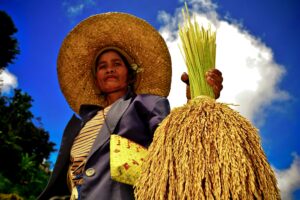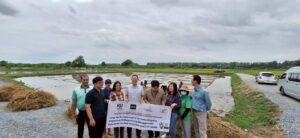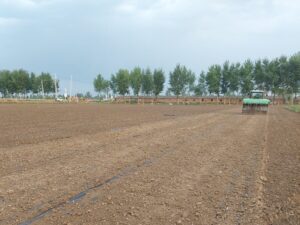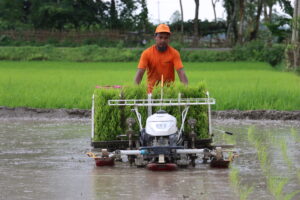By Ankita Tiwari

Across the Global South, countries face shared challenges, climate change, food insecurity, fragmented markets, and limited resources for research and innovation. Yet these nations also share a unique strength: a wealth of knowledge, diverse farming practices, and complementary innovations that, if exchanged and scaled, can transform agriculture and rural livelihoods.
This is the promise of South–South cooperation, a model where countries learn from one another, adapt solutions to local contexts, and pool efforts to achieve the Sustainable Development Goals. By working together, the Global South can accelerate progress on food security, resilience, and inclusive growth far more effectively than working in silos.
Transforming cooperation into action
On September 12, the world observes the United Nations Day for South–South Cooperation, a reminder of the power of solidarity among countries of the Global South. At IRRI, South–South cooperation is not just a principle but a strategy in action. Anchored in the institute’s 2025–2030 strategy, which focuses on the three impact goals of Improved Nutrition, Sustainable Planet, and Inclusive Livelihoods, we aim to ensure that research and partnerships translate into real-world benefits.
Through initiatives like Seeds Without Borders, we are improving farmers’ access to nutritious and resilient rice varieties, advancing both nutrition and livelihood security. With digital tools such as SeedCast, we are promoting sustainability and efficiency in seed systems, helping reduce waste and improve planning. Cross-country training exchanges and policy dialogues hosted at the IRRI South Asia Regional Centre (ISARC) foster inclusive learning networks, ensuring that smallholders, researchers, and institutions across Asia and Africa benefit equally. These and many other initiatives and efforts show how solidarity among nations of the Global South are shaping measurable impact for farmers and food systems.
Collaboration that delivers impact
IRRI’s continuing focus on South-South collaboration demonstrates how partnerships are translating into impact:
- Seeds Without Borders (SWB). A pioneering regional seed policy agreement that fast-tracks varietal release and movement across India, Bangladesh, Nepal, Bhutan, Cambodia, and Sri Lanka. When a farmer in Nepal plants a high-yielding rice variety originally developed in India, or when a breeder in Cambodia fast-tracks varietal release using lessons from Bangladesh, we see how borders blur in the service of food security. This is the essence of the SWB initiative, which IRRI helped establish. By reducing bureaucratic delays and creating a common policy framework, SWB has enabled farmers in multiple countries to benefit from each other’s innovations. Recognized globally for advancing science diplomacy, SWB now has a dedicated secretariat and is working toward inter-continental collaboration between Asia and Africa for seed sharing and release.
- SeedCast App. First conceptualized in India in 2021, SeedCast is a farmer-centric digital innovation that, within just a few seasons, proved to be so useful that governments and partners in Bangladesh and Tanzania sought to adapt it. For a Tanzanian seed producer, this meant fewer losses due to unsold stock. For a Bangladeshi farmer, it meant getting the right seeds at the right time. What started as a pilot in one region has now become a digital bridge across continents. The app connects farmers, seed producers, and dealers to ensure timely access to quality seeds through reliable demand forecasting and supply planning, supported by cross-country technical exchange.
- Strengthening seed systems and capacity. IRRI continues to support governments and institutions to enhance breeding innovations, seed systems, and value chains, while organizing cross-country trainings, exposure visits, and seminars for knowledge exchange.
- Innovating for resilience. From climate-smart agriculture to mechanization and digital tools, IRRI is driving the development and adaptation of technologies tailored to diverse agroecological and socio-economic contexts.
- Knowledge platforms. Through partnerships such as the IRRI–ICRISAT Center of Excellence for South-South Cooperation in Agriculture knowledge portal (ISSCA), IRRI is enabling farmer-to-farmer and scientist-to-scientist exchange across Asia and Africa.
- Regional hub. The IRRI South Asia Regional Centre (ISARC) in Varanasi continues to serve as a central hub for facilitating these collaborations, strengthening policy dialogue, and building regional capacity.
Deepening partnerships for a shared future
As part of this year’s observance, IRRI experts and government partners participated in the India–Africa Seed Summit in Hyderabad, engaging in fresh dialogues to expand opportunities for intercontinental collaboration in seeds and varietal exchange.
Building on this momentum, IRRI Director General Dr. Yvonne Pinto shared a special message at the upcoming ICRISAT webinar on Scalable Solutions for Crop Improvement and Production Technologies for the Global South. “Cooperation is not a one-time effort but a continuous commitment,” she emphasized. “We stand ready to deepen partnerships, co-create innovations, and scale impact across the Global South. We call on policymakers, donors, and development partners to support and invest in these efforts so that our shared initiatives can sustainably reach even more farmers and future generations.”
As the world looks toward achieving the Sustainable Development Goals, IRRI reaffirms its role in accelerating progress toward a food-secure, climate-resilient, and sustainable future, through the power of South-South cooperation.





